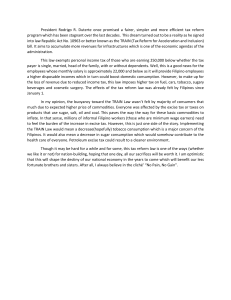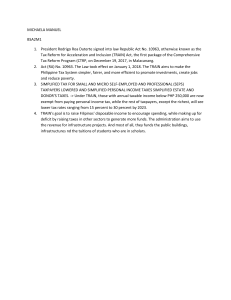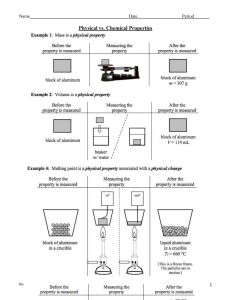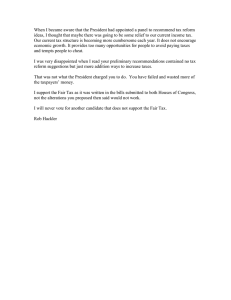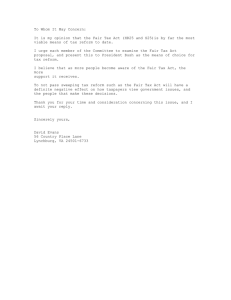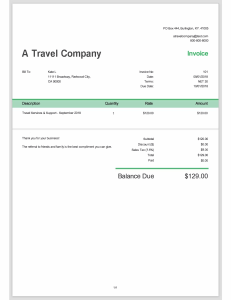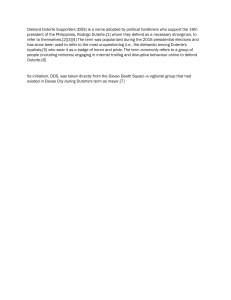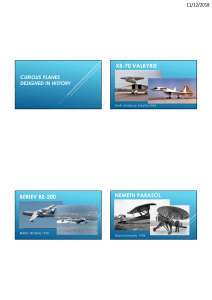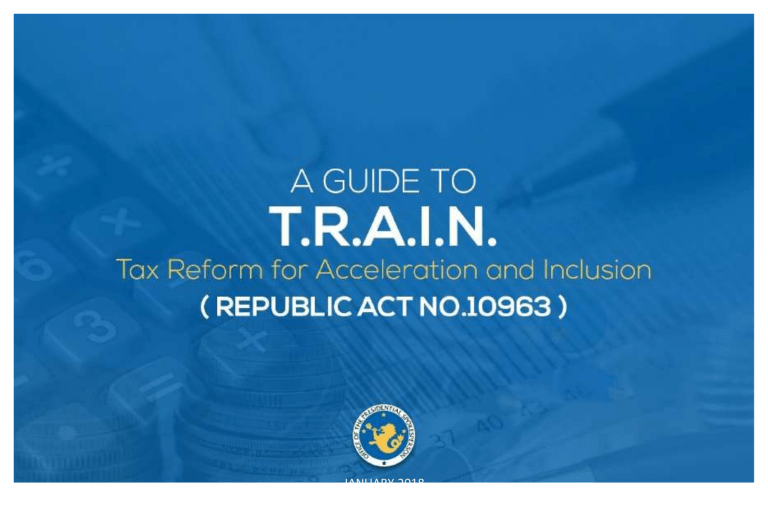
!"#$"%& ()*+ This year marks the full implementation of the Tax Reform for Acceleration and Inclusion (TRAIN) Act. This landmark measure is among the cornerstones of President Rodrigo Roa Duterte’s poverty alleviation initiative. Having said this, it is the duty of government to sufficiently inform the people on how this new law would affect their everyday lives. Apart from simplifying the country’s tax system, TRAIN allows for a better collection of government revenues to fund projects on infrastructure modernization and human capital formation, all while easing the burden of the average Filipino wage earner. In line with our firm commitment to provide timely, reliable and accurate information to citizens on the benefits of the government’s agenda, we have come up with a TRAIN Primer to help explain the law’s key provisions to the public. We hope to educate and enlighten our people that this vital piece of legislation is not just a victory for the government, but also for all Filipinos. We thank the Department of Finance and the Department of Trade and Industry for their valuable inputs in this primer. The Duterte administration indeed is a government of tapang at malasakit. Expect more victories to come! Manila Presidential Spokesperson SEP ' # " ! DOF submitted TRAIN to Congress DEC 11 MAY 29 President Duterte certified TRAIN as an urgent and priority measure $ # " ! The final bicameral conference on TRAIN was held. MAY 31 $ # " ! $ # " ! House of Representatives approval in third and final reading (HB No. 5636) 246 – 9 against – 1 abstain DEC 19 $ # " ! President Rodrigo Roa Duterte signed the Republic Act 10963 also known as TRAIN law NOV 28 $ # " ! Senate approval in third and final reading (SB No. 1592) 17-1 in favor of TRAIN JAN 1 & # " ! Implementation of the TRAIN law By 2020 By 2040 A. INCOME TAXES Starting 1 January 2018, compensation earners selfemployed and professional taxpayers (SEP) whose annual taxable incomes are SEPs whose gross receipts or sales are have the TRAIN repeals Section 35 of the National Internal Revenue Code on personal exemptions of individual taxpayers. Whether the taxpayer is single, married, head of the family, with or without dependents, the taxpayer is exempted from paying personal income tax (PIT) as long as he /she is earning less than P21,000 a month. SEPs whose annual salaries are are exempt from 3% percentage tax. The 13th month pay and other bonuses amounting to P90,000 are likewise tax-exempt. B. VALUE ADDED TAXES • • • • • • • • • • • • • Raw food Agricultural products Health and education Senior citizens PWDs Cooperatives Renewable energy Tourism enterprises BPOs in special economic zones Socialized housing (P450,000 and below) Low cost housing (amounting to P3 million) Leases below P15,000/month Condominium association dues Sale of drugs for diabetes, high cholesterol , and hypertension Socialized and mass housing projects P2 million and below C. SUGAR-SWEETENED BEVERAGES To promote a healthier Philippines, sugar-sweetened beverages will be taxed. for drinks using sugar and artificial sweeteners for drinks using high fructose corn syrup All kinds of milk, 3-in-1 coffee, natural fruit and vegetable juices, and medically indicated beverages are exempted. D. PETROLEUM EXCISE TAX Through appropriately taxing dirty fuel, environmental and health concerns can be addressed. TRAIN increases the excise tax on fuel which has not been adjusted since 1997. Diesel P2.50 P4.50 P6 LPG P1 per kg P2 per kg P3 per kg Regular and Unleaded Premium Gasoline P7 P9 P10 E. AUTOMOBILE EXCISE TAX Up to 600,000 4% 2% Over 600,000 to 1 Million 10% 5% Over 1 Million to 4 Million 20% 10% Over 4 Million 50% 25% F. TOBACCO EXCISE TAX P32.50 1 January 2018 - 30 June 2018 P35 1 July 2018 – 31 December 2019 P37.50 2020 – 2021 P40 2022 – 2023 Annual 4% increase 2024 onwards G. COSMETICS TAX H. DONOR’S TAX I. ESTATE TAX J. Coal (Mineral Products) K. Nonmetallic Minerals and Quarry Resources President Rodrigo Duterte, by the power vested in him by Article VI, Section 72 of the Constitution, vetoed five line items under the Tax Reform for Acceleration and Inclusion (TRAIN) Act in an effort to "ease the burden of the common taxpayers." The vetoed five line items included the following provisions: 1. Reduced income tax rate of employees of Regional Headquarters (RHQs), Regional Operating Headquarters (ROHQs), Offshore Banking Units (OBUs), and Petroleum Service Contractors and Subcontractors. 2. Zero-rating of sales of goods and ser vices to separate customs territory and tourism enterprise zones 3. Exemption from percentage tax of gross sales/receipts not exceeding five hundred thousand pesos (P500,000.00) 4. Exemption of various petroleum products from excise tax when used as input, feedstock, or as raw material in the manufacturing of petrochemical products, or in the refining of petroleum products, or as replacement fuel for natural gas fired combined cycle power plants 5. Earmarking of incremental tobacco taxes The Department of Finance (DOF) is now fast-tracking the Implementing Rules and Regulations (IRR) of TRAIN. Even if there is no IRR yet, the law already took effect on January 1, 2018, as what is required for its effectivity is publication. In the next 5 years, the tax reform can fund public school classrooms, or public school teachers. In the next 5 years, the tax reform can fund rural health units, or barangay health stations, or provincial hospitals. INFRASTRUCTURE PROGRAMS Additional funds from the tax reform will be used for the projects of the Department of Public Works and Highways which consists of major highways, expressways, and flood control projects. of paved roads, or of temporary bridge upgrades, or hectares of irrigated land. The timely passage of TRAIN is indeed a milestone for the Department of Finance and our congressional leadership, especially the Ways and Means committees of both houses, who gave their full support for this measure after numerous hearings and hundreds of public consultation nationwide. This is the administration’s biggest Christmas gift to the Filipino people as 99 percent of the taxpayers will benefit from a simpler, fairer, and more efficient tax system. One of the TRAIN’s most significant breakthroughs is that beginning January 1st 2018, those earning below P250,000 will be exempt from income tax. And I thank all of you. The law also addresses long and overdue corrections in our tax laws and introduces a more progressive tax system [where] the rich and the poor will contribute to give better services to our people. Revenues from the TRAIN will fund our priority projects to ensure a quality education, including free tuition in state universities and colleges, equally, quality health care, social protection and conditional cash transfers, improved infrastructures to the Build, Build, Build program and the reconstruction of Marawi. This is just an initial part of our gains under the comprehensive tax reform programs as Congress has passed two-thirds of the expected revenues from the Package 1 of TRAIN. During the ceremonial signing of the 2018 General Appropriations Act (GAA) and Tax Reform for Accelerations and Inclusion (TRAIN) on December 19, 2017
